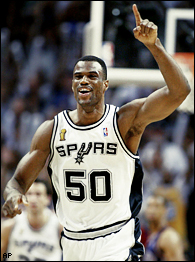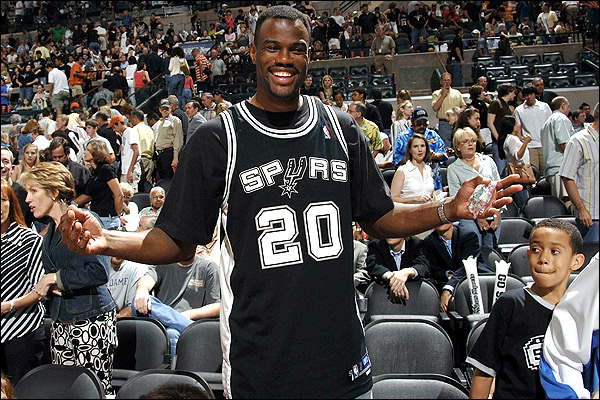David Robinson will go down in basketball lore as one of the greatest to ever play the game. As validation, he will be enshrined in the Naismith Basketball Hall of Fame in Springfield, Mass., later this month as part of one of the best Hall of Fame classes in recent memory, a class that includes Michael Jordan and John Stockton.
His resume stands out like a 7-foot-1 Ensign in the United States Naval Academy: two-time NBA world champion, won MVP in 1995, Defensive Player of the Year in 1992, Rookie of the Year in 1990, four-time NBA first-team selection, Olympic gold medalist in 1992, 10-time All-Star and selected one of the 50 greatest players in NBA history. He also scored 71 points against the Los Angeles Clippers in the final regular-season game in 1994 to win the scoring title.
It is hard to compare Robinson to anyone in the league because he was unique. He was a chiseled 7-footer with zero body fat who could run the floor like a guard. He could post up, face up and shoot, and defense was stout. His quickness and length made it extremely hard on the opposition to score on him. He had some great battles with fellow Hall-of-Famer centers Hakeem Olajuwon and Patrick Ewing throughout the 1990s.
Aside from being a great player, Robinson was also selfless. When the San Antonio Spurs selected Tim Duncan with the first pick in the 1997 NBA draft, Robinson accepted the role of secondary player and allowed Duncan to grow into his role as the focal point of the Spurs’ franchise. With Robinson manning the center spot and Duncan providing plenty of power at the forward position, the Spurs won NBA titles in 1999 and 2003.
Despite all of his accomplishments on the court, the man known as The Admiral has had a bigger impact off the court.
Robinson’s legacy includes being one of the preeminent philanthropists in all of professional sports. On March 23, 2003, NBA Commissioner David Stern announced that future winners of the NBA Community Assist Award would receive the David Robinson Plaque, with the inscription, “Following the standard set by NBA Legend David Robinson, who improved the community piece by piece.”
Among Robinson’s charitable achievements was his $9 million commitment toward the construction and operation of The Carver Academy, an independent school for San Antonio students from a culturally diverse community. Receiving a good education was a big part of Robinson’s life, and that was never muddled even when he was earning millions as a pro athlete. Though sports afforded him a lifestyle most would envy, Robinson was always preaching school work and going to class.
He was a stand-up guy and one of the real “nice guys,” not just in basketball but in all of sports. But it also gave the impression that Robinson was too soft. Radio shock-jock Jim Rome once called him “The Little Mermaid,” mocking Robinson’s affinity for the Disney movie. Sports Illustrated tabbed him “Saint David” for being too good to be true.
But it’s true. David Robinson was a saint. He was also a class act.
I had an opportunity to meet Robinson two years ago at Staples Center in Los Angeles. The Lakers had just defeated the San Antonio Spurs, the only team Robinson played for during his 14-year career. As I was walking out of the arena, I saw Robinson and his son headed in the same direction. For a man who had been retired for four years, The Admiral looked like he could still beat half the centers in the league. He was in phenomenal shape.
I approached him and said, “I think we just got a preview of the Western Conference finals.” Robinson replied: “You guys got a good team.” Then, as we crossed Figueroa Street en route to the parking structures, a group of people began harassing Robinson for autographs and pictures. He didn’t turn down a single one.
As he got close to his ride, I told Robinson “good luck with everything.” He then shook my hand and said, “Nice to meet you.” Now, it wasn’t much but a handshake from The Great David Robinson goes a long way in my book.

